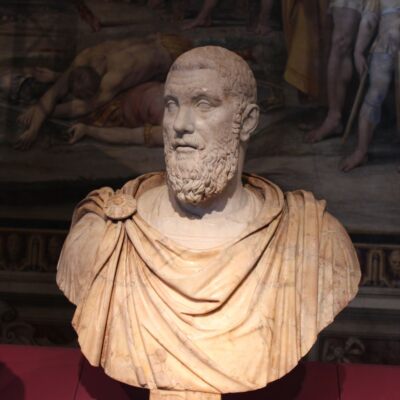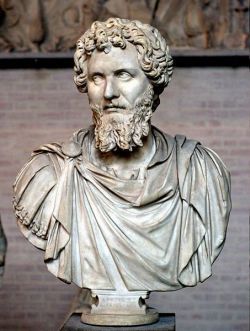Chapters
| Name | Gaius Pescennius Niger Iustus |
|---|---|
| Ruled as | |
| Reign | 193 – 194 CE |
| Born | c.135 CE |
| Died | autumn 194 CE |
Gaius Pescennius Niger was born c. 135 CE as Gaius Pescennius Niger Iustus. He was the governor of Syria, and later in the years 193-194, he was on of the usurpers during the “Year of the Five Emperors”.
According to the unbelievable history described in the Augustan History (a collection of emperors’, successors’ and usurpers’ biographies), he received the cognomen “Niger” due to the fact that his neck was black.
Career
Niger was born in an old family of equites and was the first man from the family to be a senator. Not much is known about his early life and career. He was probably an administrator in Egypt and took part in the military campaign in Dacia during the early reign of Commodus. In the late 80s of the 2nd century CE, Niger became consul suffectus, and then in 191, Commodus appointed him legate of Syria.
Niger was staying in Syria when he heard the news of Pertinax being murdered and Didius Julianus taking over the imperial office. Niger had good reputation in Rome and many citizens wanted him to be an emperor. Herodian claimed that Niger was rather old and rose his fame with his deeds. He enjoyed a good opinion as he was brave and skillful, and he imitated Pertinax in his way of life, which endeared the Romans.
Thus, at all the meetings, they invoked his name continually, and while Julian was reproaching him in his presence “even though Niger was absent, they were shouting, as if he was an emperor1“. Herodian also describes the moment of the decision to proclaim Niger the emperor:
When the attitude of the Roman people and their actions were reported to him, Niger was naturally acquiescent and believed that affairs would turn out as he wished, with no difficulty. The fact that Julianus had been deserted by the praetorians because he failed to give them the money he had promised and the fact that he was despised by the people for the shameful way in which he had bought the empire encouraged Niger to be sanguine about his chances of becoming emperor.
As the first step, he summoned a few commanders and tribunes and prominent soldiers to his quarters; there he discussed the situation with them and won their support. He revealed in detail what he had heard from Rome, with the intent that, when this news was made public, it would become common knowledge to the soldiers and to the rest of the peoples of the East.
He hoped to win the support of all of them without difficulty when they understood that he was not attempting to seize the empire by plotting but rather that he was going to the assistance of the people at Rome, who were begging for him to come. All the Eastern peoples flocked to his support and implored him to take charge of affairs.– Herodian, History of the Roman Empire, II.7
There is a presumption that as a result of civil unrest about who should rule, Julianus sent a centurion to the east with the order to kill Niger in Antioch.
Struggle for power
Finally, at the end of April 193 CE eastern legions proclaimed Niger an emperor, and he adopted the “Iustus” cognomen. Although Niger sent envoys to the capital with information about his taking over the power over empire, most (or all) of them were captured by Septimius Severus (another rival to the throne). While Niger was building his emperor’s position in the eastern provinces, Septimius Severus moved to Rome and in early June 193 CE, he murdered Julianus.
Right after taking Rome, Septimius gave an order to Lucius Fulvius Plautianus (prefect of the watch), to capture Niger’s children as hostages. At that time, Niger himself was busy gathering the support of the Asian provinces’ administrators. On his behalf in Byzantium, ruled proconsul of Asia – Asellius Aemilianus. Taking over Byzantium was the usurper’s great achievement. Niger also decided to take full control over Egypt. Septimius Severus was most afraid that the rival would limit the supply of grain to Rome. To this end, he did everything to prevent Niger from reducing the transport of supplies. At the same time, the emperor ordered loyal soldiers to observe the western border of Egypt and prevent II Trajan’s legion from supporting Niger. The ruler in the east, even though he had enormous supplies of grain, could not equal in military terms with Septimius Severus. Severus had under his command 16 danubian Legions, when Niger had only six divisions: three Syrian, two stationed in Arabia Petraea and one in Melitene (today’s Turkey).
Pescennius Niger, realizing his weak military resources, decided to be aggressive and dynamic. He sent troops to Thrace, where they defeated part of Severus’ army at Perinthus (oday’s European part of Turkey). Severus’ forces were led by Lucius Fabius Cilo.
At the news of the failures of his troops, Severus left Rome, having earlier sent Tiberius Claudius Candidus. At that time, Bantor’s main headquarters was Byzantium. The emperor “in the east” ordered the defense of the southern shore of the Sea of Marmara (commanded by Asellius Aemilianus). When Severus was near Niger’s position, he offered his rival surrender and exile. Niger, however, rejected the offer, believing it was the outcome of the armed clash.
At the end of 193 CE Candidus, commanding Severus’ troops, fought with Aemilianus in the battle of Cyzicus (Turkey). As a result of the fierce battle, Severus’ army completely defeated the enemy, whose remains escaped from the battlefield. Fleeing from the battlefield, Aemilian was captured and executed by the order of Severus. Thanks to this victory, Severus’ army entered Bityhnia. Byzantium was in siege, and Niger was forced to leave the city and go to Nicaea. The capital Nigra (Byzantium) remained faithful to him. The city was captured only at the end of 194 CE after the death of the usurper in the east.
Another battle took place at the end of December 193 CE, near Nice. At that time Severus also won. In January 194 CE there was another battle between the armies of Severus and Niger near the town of Kius (Kios) in Bithynia. The beginning of the battle belonged to the forces of Septimius Severus, as they gained an advantage. After Niger’s reinforcements arrived, the scale of victory tilted, however, to the side of the latter. At that moment, Severus, commanding the forces of Severus, Claudius Candidus made a counterattack that broke the opponent’s ranks. Thanks to the quickly falling darkness, the army of Niger saved itself from defeat, retreating from the battlefield. The losses of Niger’s troops were enormous and could amount to half the initial state of forces participating in the battle.
At that time Septimius Severus changed the commander of his legions. Candidus was replaced by Cornelius Anullinus, who fought with Niger at Issos in May 194 CE. The army of Pescennius Niger, in the strength of 40-50 thousand people, occupied positions on the hill overlooking the steep plain. Less numerous but more experienced troops of Septimius Severus led by Anullinus positioned themselves in front of the enemy. Military camps were located at the rear of both armies. The attack began at dawn with Severus’ soldiers, hitting Niger’s testudo formation on the hill. This attack was repulsed. Next, Niger’s troops began their march down the slope, pushing the opponent towards the camp. At that moment a violent storm broke out, which weakened the impetus of Niger’s attacking soldiers. At the same time Severus’ drove passed the opponent’s flanks, attacking him from behind. Theconfusion in Niger’s ranks was used by Anullinus, who attacked from the front. The attack from two sides caused panic of Niger’s forces, only part of which managed to get out of the lap. About 20, 000 soldiers died during this battle and during the escape to Antioch. The history of Pescennius Niger came to an end in the city.
Death
Gaius Pescennius Niger died in 194 CE. The emperor was captured when he tried to flee to Parthia. His head was cut off and then sent to Severus. This is how Herodian describes the usurper’s death:
Mounting a good horse, Niger fled with a few companions to Antioch. There he found the survivors of the rout, weeping and wailing, mourning the loss of sons and brothers. Niger now fled from Antioch in despair. Discovered hiding in the outskirts of the city, he was beheaded by the pursuing horsemen.
– Herodian, History of the Roman Empire, III.4
All Niger’s supporters were punished; children and wife first expelled, then killed; and the property of the family was taken over.
In December 195 CE Byzantine came to the victors’ hands, and its inhabitants did not want to fight after learning about the emperor’s death.









